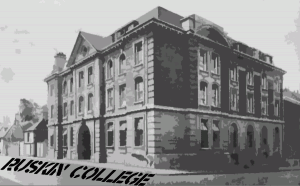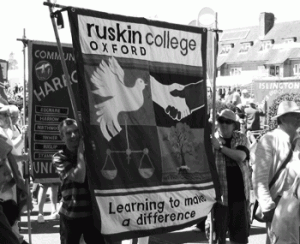Education
I originally found out about Ruskin College after sorting through some newspapers to burn on the fire in my living room, back in early 1996. As I sorted through the various
newspapers and magazines, I came across a scrap of paper from the Guardian which had a little add for Ruskin College on it. I wrote the address down and posted off for some more information and an application form. At the time, I was unemployed, had no qualifications, and had become tired of carrying out Low paid Labouring work.
I was absolutely bowled over when I read the information pack and found out that they were a College in the centre of Oxford who had traditionally recruited people from working class and trade Union backgrounds. I applied to study at the College immediately and was interviewed over the phone less than a week after applying, the tutor Mavis
Bayton, called me back next day and offered me a place on her course. Within a month, I was running around various friends and family members borrowing the money for the train fair to Oxford to begin my studies in the social sciences.
Historical background
Ruskin College began life in 1899 in Oxford and was named after the Art critic and social commentator John Ruskin. The intentions of the colleges American founders Charles
Beard, and Walter Vrooman was to make education available for people from working class backgrounds in Oxford one of the most important and elitist places of learning in the UK, where there was previously no provision. Walter Vrooman’s wife Amne offered her financial support and so Ruskin College was born. A major catalyst in the development of Ruskin College was down to the fact that Both Beard and Vrooman had both studied in Oxford in their earlier days and were saddened that there were no ordinary people studying at the University, only those from wealthy and aristocratic backgrounds. From its inception onward Ruskin College became a symbol and marker for working class education, and was attended by people from the trade Union, and Labour movement.
Learning at the college
 When I went to Ruskin College I managed to gain access as a result of my telephone interview, where I was asked what sort of area I lived in, and a little about my interests and family background. When I entered into Education at Ruskin College, I had no formal qualifications to speak of, other than 3 mediocre CSE qualifications from my Secondary School days.
When I went to Ruskin College I managed to gain access as a result of my telephone interview, where I was asked what sort of area I lived in, and a little about my interests and family background. When I entered into Education at Ruskin College, I had no formal qualifications to speak of, other than 3 mediocre CSE qualifications from my Secondary School days.
This is a unique feature of Ruskin College, if you have worked in a certain sector, or have had an interesting and educational life experiences, the College will view this as a qualification within its own right other than one that you have gone to college to study for. Whilst actually studying at the College, teaching staff are aware that many of its students will have little or no understanding of academic methods, and offers an incredible level of support, including study skills groups, personal or small group weekly tutorials.
As Ruskin is a Political college, by the very fact of why it was opened up in the first place, and the people who have traditionally attended, its courses offer working class people the chance to learn about and combat their own oppression through education. For me personally, the college offers a fully inclusive and progressive form of education to those who were previously denied access to further and higher education because of the financial and work situations and I am eternally grateful to the College for giving me the chance to study there.
For a permanent culture
An inclusive, progressive and Political education is an important part of how we need to develop educational models for a sustainable and just future, places like Ruskin College create the opportunities and space where Political and Philosophical ideas can flourish. And for a fairer future that we all want to see, the Ruskin College of the present is providing social justice through education for the future.
